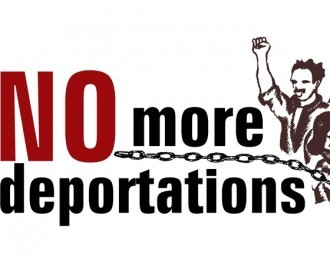Enira Bronitskaja: I hope that civic society is able to help Elena Tonkacheva

There are different ways to keep the famous human rights defendant in Belarus; what is important is not to give up.
Less the a month is left before Elena Tonkacheva, the famous human rights defendant and the head of the Centre for Legal Transformation “Lawtrend”, is deported from Belarus. After the decision about her deportation and the following press conference the clamor in press settled, and the transparent case seemed to be forgotten up to the moment when the respected lawyer is expelled from the country.
A correspondent of “EuroBelarus” Information Service talked with Enira Bronitskaja, the head of the Office for the Rights of People with Disabilities, who created a petition in support of her colleague and is not going to give up.
- Just in 5 days about 7 thousand signatures were collected, but that didn’t stop the Pershamaiski District Department of Internal Affairs from making a decision about Elena Tonkacheva’s deportation. We have a month before the deportation. Is the civil society able to help Tonkacheva? What methods should we try?
- I hope that the civil society is able to help Elena Tonkacheva by using different options. And besides, the decision about the deportation and deprivation of residence permit will be appealed. It seems to me that we should continue appealing to the Municipal Department of Internal Affairs of the Minsk City Executive Committee and talk about our dissent with such situation, that we care about Elena as a person who has been living in Belarus for a long time, who is our friend, colleague, companion.
I had a feeling that the Pershamaiski District Department of Internal Affairs already had a decision sent down from the authorities, and they merely voiced it. At the same time, it is clear that a lot of political decisions are made in this country. Some of them can be influenced if we draw the attention of non-politicians but common citizens and civil society organizations instead.
We should call to the District Department of Internal Affairs, we can write to them. For example, we wrote there on behalf of the Office for the Rights of People with Disabilities, as Elena is a member of the Office’s Supervisory Council.
On November 11 we sent a letter in which we told that our organization does a lot for the people with disabilities, and all that is done with Elena’s help. Without her, we will lose a lot.
Some employees of the Pershamaiski District Department of Internal Affairs said that we all had one and the same appeal, but it is personal stories that can move us…
It is true, but I think that we should go on with what we have started.
- Do you find the information wave around the decision about the deportation of the human rights defendant sufficient?
- There was a lot of information after Elena Tonkacheva announced the decision to cancel her residence permit and up to the time when decision about her deportation was made: international and national statements, a lot of media at the consideration of Elena’s case in the building of the Pershamaiski District Department of Internal Affairs.
And after the decision and press conference on this issue I had a feeling that this is the end, and everyone is waiting for Elena to be deported. So I’m really grateful that you raise this topic again.
I want the actions in this regard to continue. We should keep talking about it, look for opportunities and reasons to maintain solidarity and support. It is hard for Elena to fight alone now! At the press conference she announced that she would ritually appeal the decision on deportation, but she seems to be tired of this situation…
I think that those civil society organizations and civic activists Elena was helping and her friends should continue doing something for her, by this showing that we shouldn’t be organized for that.
For example, in the Pershamaiski District Department of Internal Affairs we were told that our petition is obviously made to order, as people won’t sign the petition for some person who is deported from the country so quickly and so easily.
- What are the formalities why thousands of signatures were ignored?
- There are a few moments. Internet appeals should contain full address or an email of the person who signs the appeal. We sent the appeals through change.org, but many of these appeals had incomplete addresses, and emails were hidden for confidential reasons.
We realized that the authorities might be obstinate in receiving petitions because of these technicalities; the petitions answered several aims. Moreover, everything that is sent to the email of the authorities has to be considered.
- How is the collecting of signatures under petitions and appeals working in Belarus? Is there any sense to collect them?
- Frankly speaking, I don’t know. It was the first petition is my life. Petition is mainly a way to draw attention to the problem and a possibility to spread information about it in the society. As a creator of the petition I can send an email to 7 thousand people who signed it simultaneously and keep on informing them how the petition is promoted.
It happened so that first the petition was created and after that civil society organizations solidary with Elena Tonkacheva caught up with the rest. The petition might be good for drawing attention, but this is not exactly a judicial mechanism.
- Were there foreign citizens among those who signed the petition?
- Yes. Of course, I didn’t look through all seven thousand signers, but I remember there were signers from the US. I forwarded Lena 20 pages of comments after the petition of how her work is important.
-
03.01
-
07.10
-
22.09
-
17.08
-
12.08
-
30.09



























